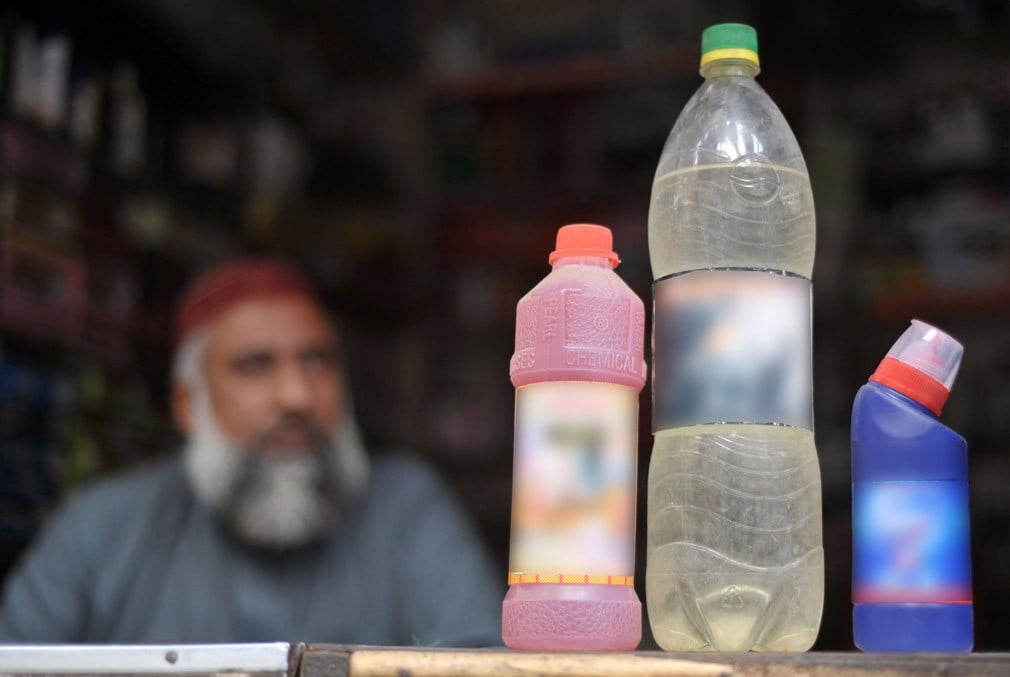
Easy availability of dangerous acids must be controlled to stop incidents of acid crimes mostly against women

It was easy for Ahsan bin Rashid to buy sulphuric acid from a chemical market near Lohari Gate, Lahore, for as cheap as Rs15 per kg. No questions were asked about the buyer’s identity or the acid’s usability.
Rashid got the acid for his small retail shop in Mughalpura. "We sell acid to people but never ask customers who they are or what they want it for," he says.
These acids are so strong that they cause body tissues to melt, often damaging bones, sometimes even dissolving them. Victims of sulphuric acid attacks seldom survive. Hydrochloric acid is used in cases of suicide. Yet, buying and selling dangerous acids is easy business. Other than sulphuric acid, corrosive substances like nitric acid and hydrochloric acid are marketed at cheap rates in small shops located in different parts of Lahore, Quetta, Peshawar and Karachi.
Last week, acid crime attracted every one’s attention when a woman Shamim Bibi, a mother of four, doused her lover, Sadaqat, with acid after he refused to marry her in Multan. On June 21, the victim succumbed to 50 per cent burn injuries at Nishtar Hospital Burn Unit.
In another incident, some unidentified people stormed into the house of Amina Bibi, 22, in Salamat Colony, Harbanspura, and threw acid on her. In yet another incident, a mother, Tayyaba, 35, of Garaywala in Multan, after a clash with her husband, forced her two daughters Manahil, 2, and Hijab, 8, to drink acid before consuming some herself. Ruqayya Bibi and her daughter from Taranda Basharat village, Uch Sharif, were asleep when Shafiq threw acid on them. Both were hospitalised at the Bahawal Victoria Hospital in Bahawalpur.
As per data provided by the Acid Survivor Foundation (ASF) Pakistan, a non-profit organisation working since 2006 to eradicate acid violence from Pakistan, between 2007 and 2015, there have been 512 victims of acid crime in South Punjab, 168 in Central Punjab, 20 in Sindh, 10 in Balochistan, 18 in KP and three in AJK.
The rate to acid crimes is the highest in South Punjab, where acid is widely used to cleanse seeds and in other procedures involved in cotton production.
"Its easy availability has made acid a poor man’s weapon which he uses to settle scores in a barbaric manner," claims an ASF Pakistan official.
Dr Hamid Ansari, a senior faculty member of the Burn Unit and Plastic Surgery Department in Mayo Hospital, Lahore, confirms, "sulphuric acid is the most common cause of serious burns".
Under the Poison Act (XII) of 1919, government issues licences for possession and sale of poisonous substances including acids but only for commercial purposes with conditionality. Its sale is limited to only industries relating to textile, tanneries, marble cleansing, iron-polishing, pesticides, pharmacy, batteries and others. There is strict ban on their sale without license.
But who cares?
In the wake of fragile enforcement and inspection system, people with criminal intent buy these acids without any fear.
"For the law to be foolproof, it needs immediate amendment," says Nasir Khan, a legal expert on licensing. "There was a court ruling that pragmatic amendments to the law for regulating acid business may be enacted to prevent the rising incidence of acid attacks against women in the country. It snubbed the federal government for keeping the gaps in law unplugged."
The surge in demand for UPS and lead batteries has increased the easy availability of acids in markets. In order to manufacture batteries, small places in residential areas have been converted into small factories where sulphuric acid is normally stocked. "There are hundreds of such units in streets in the length and breadth of Pakistan, where acid is stored in drums," says Abid Ali, Programme Officer, Aurat Foundation, a non-government organisation working for women empowerment.
Acid-throwing was not considered a crime till six years back. "Prevention of Anti-Women Practices (Criminal Law Amendment) Act 2011 recognised acid and burn violence as a crime against the state for the first time, with a fine of Rs1 million and life-time imprisonment," says Zainab Qaisrani, Project Coordinator, ASF Pakistan.
According to her, the next target was to get the Acid and Burn Crime Bill 2012 approved that comprehensively deals with the regulation of sale and purchase of acids in the market. The bill is still pending.
The recently passed Punjab Protection of Women against Violence Act 2016 is a glimmer of hope for women facing all forms of domestic violence but does nothing to check the sale and purchase of acid in open market.
The Punjab Commission on the Status of Women (PCSW) that aims to review the Punjab laws, rules and regulations affecting the status and rights of women, has not compiled reports and data on acid sale and purchase, legal and illegal.
Sonia Qadir, legal advisor PCSW, says commission does not have the mandate to draw out modalities and various TORs for acid business. However, under the first ever helpline and complaint mechanism, they have received 34,814 inquiries, "out of them, 26 are about acid burns."
PCSW Punjab Gender Parity Report 2016 claims 6,505 cases of violence against women were reported with only 1 per cent conviction rate in 2015. Among them, 22 incidents of acid throwing were reported in Punjab.
It’s obvious that this nation needs political will to check this crime.